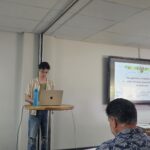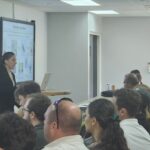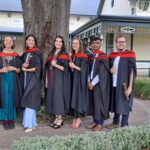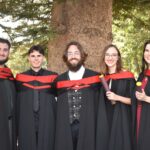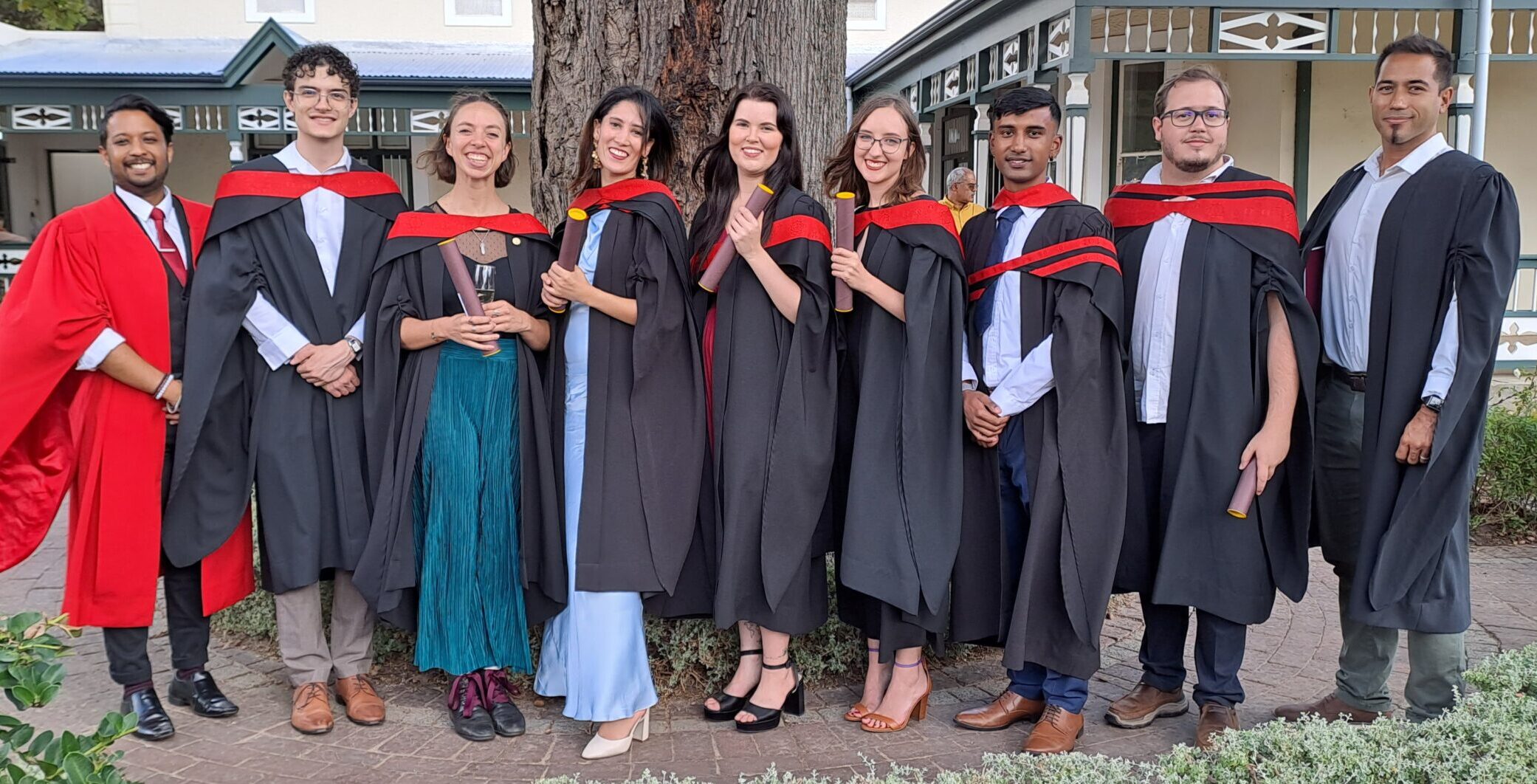
Honouring Excellence: Genetics Department Celebrates March 2025 MSc and PhD Graduates
On March 26, 2025, the Department of Genetics proudly celebrated the graduation of ten MSc students and two PhD candidates, In the lead-up to graduation, each student conducted rigorous research and as part of the academic requirements, students were required to deliver a formal 20-minute defense presentation to the department. These sessions were attended by academic staff, fellow students, and, in some cases, supportive family members. Following each presentation, an examination panel engaged the candidates with in-depth questions designed to assess their scientific understanding, methodological rigour, and critical thinking. The process concluded with a panel deliberation to determine the outcome, making this not only a celebratory milestone but also one earned through a highly demanding and scholarly process.
Under the supervision of Prof Johan Burger and Dr Manuella Campa, two students led projects that contributed to the advancement of plant molecular biotechnology. Mr. K Kruger explored the use of RNA interference to induce GVA virus resistance in Nicotiana benthamiana, offering insights into viral control strategies in crops. Meanwhile, Mr. P Bosman investigated virus-induced genome editing in wheat, developing a novel system for gene-editing delivery, an exciting leap forward in functional genomics.
Mr Willem Botes, head of the Plant Breeding Laboratory, supervised two students working on wheat improvement. Ms. KJ Holster applied high-throughput markers to identify yield-related traits, strengthening the department’s role in pre-breed
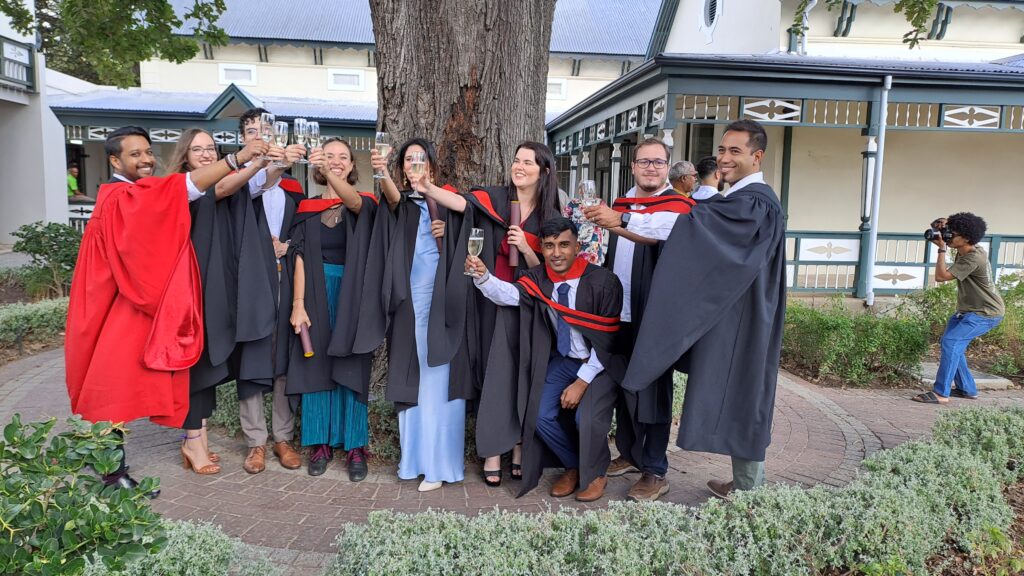
ing for food security. Ms. M van der Hoven contributed important data on pollen-mediated gene flow in wheat and related species, supporting biosafety frameworks in breeding programs.
Dr. Marlon-Schylor le Roux supervised Mr. D Allsopp, whose work focused on the Serpin-Z2B gene in common bread wheat under drought stress. This research deepened our understanding of stress response mechanisms in cereals and highlighted potential genetic targets for genetic engineering for enhancing drought tolerance.
Within marine and conservation genetics, Prof Aletta Bester-van der Merwe supervised Ms. K Redelinghuys, whose research examined the evolutionary connectivity of whiprays across the Southwestern Indian Ocean, a study with significant implications for marine conservation management. Prof Clint Rhode supervised Ms. M Roux’s research which was focused on genome-wide characterisation of repetitive elements in the dusky kob, contributing to our genomic knowledge of this ecologically and economically important species.
In forestry genetics, Ms. G Dyer, under the guidance of Dr. Paul Hills, developed a laboratory protocol for the in vitro micropropagation of hybrid Pinus patula × Pinus tecunumanii. This work adds practical value to clonal propagation techniques in commercial forestry.
The medical genetics track was represented by Ms. M Collins, supervised by Dr Brendon Pearce, who investigated mitochondrial DNA mutations linked to intervertebral disc degeneration. This research offered important insights into the molecular basis of spinal disorders and the future of personalised medicine.
From the Institute for Plant Breeding and Biotechnology (IPBB), Mr. B Moodley completed a project under the leadership of Dr Shuan Peters, focusing on the functional role of late embryogenesis abundant (LEA) proteins in drought tolerance in sugarcane, a crop vital to southern Africa’s agricultural economy.
The department also proudly celebrated the graduation of two PhD candidates:
Ms Jessica Vervalle, supervised by Dr. Justin Lashbrooke, completed her PhD on the molecular mapping of fruit quality traits in grapevine, advancing our understanding of key genetic loci associated with fruit development and composition. Her research, recently published in the Journal of Experimental Botany, provides important insights to support breeding programs aimed at enhancing fruit quality in viticulture.
Mr Carel van Heerden, supervised by Prof Johan Burger, focused his PhD research on the genetic analysis of downy and powdery mildew resistance in grapevine, offering a comparative study between the ‘Regent’ and ‘Red Globe’ cultivars. His work makes a significant contribution toward breeding grapevine varieties with improved disease resistance, a crucial step for sustainable and resilient crop production.
Each graduate journeyed through a robust and supportive academic environment, emerging not only as subject matter experts but also as skilled critical thinkers and problem-solvers. Some will take their expertise and ingenuity to industry, research institutions, and policy development by entering the workforce, while others will continue to hone their academic careers through doctoral studies. The Department of Genetics applauds their achievements and looks forward to following the remarkable contributions they will continue to make in advancing the field of genetics both locally and globally.
As your departmental scribe, it is a privilege to witness these new beginnings, and I look forward to sharing many more stories of discovery, resilience, and innovation from our growing community.
Composed by The Department Scribe – M. le Roux







